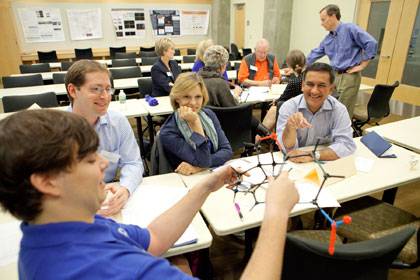
Flashing lights and a cheering crowd filled Cameron Indoor Stadium Saturday evening, but not for a basketball game. Instead, hundreds of university alumni and other supporters gathered in the iconic facility to celebrate Duke's new $3.25 billion development campaign, Duke Forward.
"Forward is the trajectory that Duke has been on from the beginning," President Richard H. Brodhead told them.
The president encouraged their support for Duke's "audacious dreaming" and pursuit of "a new model of education" that will engage students and researchers across disciplinary boundaries to address society's biggest challenges. He went on to say the campaign has raised $1.32 billion during its "silent phase" over the past two years.
"As great as it is, we need Duke to be better," said men's basketball coach Mike Krzyzewski, whose workplace was transformed with a special floor, video screens, displays about Duke programs, a jazz quintet and food stations. "We're not as good as we can be. That's basically what the campaign is all about."
The audience also heard from the three campaign chairs -- trustees Anne Bass, Bruce Karsh and David Rubenstein -- and from faculty and students. Standing before a giant screen of shimmering water, one group described its efforts to map the oceans and bring clean water to developing countries. Dr. Joanne Kurtzberg then reviewed her pioneering research on stem cells and pediatric cord blood, ending by welcoming on stage a patient whose life she helped save two decades ago and who has since grown up to become a researcher in her lab.
"There's nothing better in life than helping other people," Rubenstein said. "We have enormously ambitious goals, but they're achievable goals."
The event capped a weekend of activities that highlighted the breadth of Duke's current programs and its ambitions to make an even bigger impact on its students and the world. Its campaign supports priorities across Duke's 10 schools, Duke Medicine and a range of university programs.
Participants, who included some of Duke's most generous supporters, interacted with Duke faculty, students and administrators throughout the weekend. At one Saturday morning session, for example, business professor Joe Lebouef challenged the participants to define what makes leaders effective. He discussed examples ranging from Duke basketball to soldiers at Gettysburg, and broke his class into groups that discussed their own leadership criteria.
Simultaneously, law professor Jim Coleman told a group next door how he and others at Duke won freedom for Shawn Massey, a Charlotte man who spent 12 years in prison for a crime he did not commit. Projecting police photos from the case, Coleman explained how his group highlighted Massey's innocence by showing his hair was too short to have braids, which were seen on the perpetrator.
Meanwhile, across the street, public policy professor Don Taylor led a spirited discussion about health care reform, outlining his own prescription for how Democrats and Republicans might find common ground after the election. As buses gathered outside to shuttle participants to their next events, Taylor said, "Do we really have to stop now?" His audience, whose questions showed extensive personal experience with the topic, laughed and applauded, then kept talking for several more minutes.
Similar conversations unfolded across the campus, ranging from fairy tales to science education. One set of classes at the Fitzpatrick Center focused on "medicine that changes the world." An afternoon session asked participants to assume the roles of homeless families and international officials as a way to learn about refugee crises, much as Duke undergraduates did at a three-day event in January.
The agenda also included a breakfast discussion with Duke coaches and student-athletes. Basketball center Mason Plumlee drew the loudest laugh there when he responded to a question about career plans. "I had an internship this summer with a private wealth management firm, so I came back and started shooting more jumpers," he said. "Hopefully, someday, I'll be sitting where you guys are."
He and the other panelists spoke inside a large tent near Cameron as rain poured outside, as it did through much of the weekend. A Friday evening reception in Duke Garden was moved quickly to another tent, where dinner was prepared with food and beverages produced locally by Duke alumni.
The campaign's financial goal was unveiled before lunch Saturday in a business school auditorium where G. Richard Wagoner Jr., chairman of Duke's board of trustees, said, "We have plenty of work to do now." Citing rapid changes to research funding, health care, intercollegiate athletics, online learning and global education, Wagoner said, "It's clear the business model of research universities is under some pressure."
He was followed by Susan Lozier, chair of the Academic Council; Alex Swain, president of Duke Student Government; and Bill Hunt, president of the Graduate & Professional Student Council. Brodhead spoke last, thanking the participants for their loyalty to Duke and calling on them to reaffirm their support of the university's aspirations.
"This is a commitment ceremony," he told them, asking in the style of a wedding whether they would support the campaign. "We will!" they responded, repeating the words even more loudly when he repeated the question.
Brodhead and Wagoner also met privately with reporters at the announcement, answering questions about how Duke had decided on the campaign's goal. Brodhead emphasized the campaign does not seek resources for their own sake but, instead, to advance a strategic vision of education that will serve both students and the larger world. "We're not just saying give to dear old Duke," he said.
Below: Supporters gathered in Cameron Indoor Stadium Saturday to launch the campaign. Photo by Jared Lazarus/Duke University Photography.
